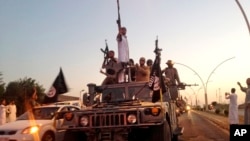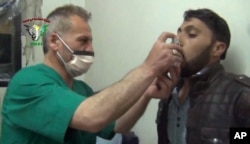Chemical weapons now appear to be a part of the Islamic State group's arsenal.
Sources close to the world's chemical watchdog told the AFP and Reuters news agencies that mustard gas was used last August in two attacks in Iraq near the Kurdish capital of Irbil.
The news came Monday, days after U.S. officials said IS jihadist fighters had the capability to make small quantities of chlorine and mustard gas and had used it in Syria and Iraq.
The Organization for the Prohibition of Chemical Weapons (OPCW), based in The Hague, said the samples it was sent after 35 Peshmerga fighters became ill near Irbil tested positive for sulfur mustard. But its report does not level the blame for the attack on any one group.
Iraqi Kurd authorities last year said two attacks were carried out by Islamic State fighters on August 11 on the frontline towns of Gweyr and Makhmur, southwest of Irbil, during which around 50 mortar rounds were launched.
"Thirty-seven of the rounds released a white dust and black liquid when they exploded. Thirty-five Peshmerga fighters were exposed and some were taken for treatment," said the Peshmerga ministry.
At the time, the ministry said, "The results of the tests on blood samples ... reveal traces of mustard gas," but the origin of the suspected gas was unclear.
Sulfur mustard — commonly known as "mustard gas" — is an oily yellow, almost liquid-like substance that smells similar to mustard or garlic. It causes severe damage to skin, eyes, the respiratory system and internal organs. It was banned by the United Nations in 1993.
Experts believe the sulfur mustard used last year came from an undeclared Syrian chemical stockpile, or that militants have gained the basic knowledge on how to develop and conduct a crude chemical attack with rockets and mortars.
Iraq's chemical arsenal was mainly destroyed in the Saddam Hussein era, although U.S. troops encountered some old chemical munitions during the 2003-2011 occupation of Iraq.
Syria gave up its chemical weapons, including stockpiles of sulfur mustard, under international supervision after hundreds of civilians were killed with sarin nerve gas in a Damascus suburb in 2013. Western countries blame that attack on Syrian President Bashar al-Assad's government, which denies it.
Organization for the Prohibition of Chemical Weapons spokesman Malik Ellahi said a team of experts has been sent to Iraq to help its investigation of possible use of chemical weapons and the findings would be made public. He offered no further details.










